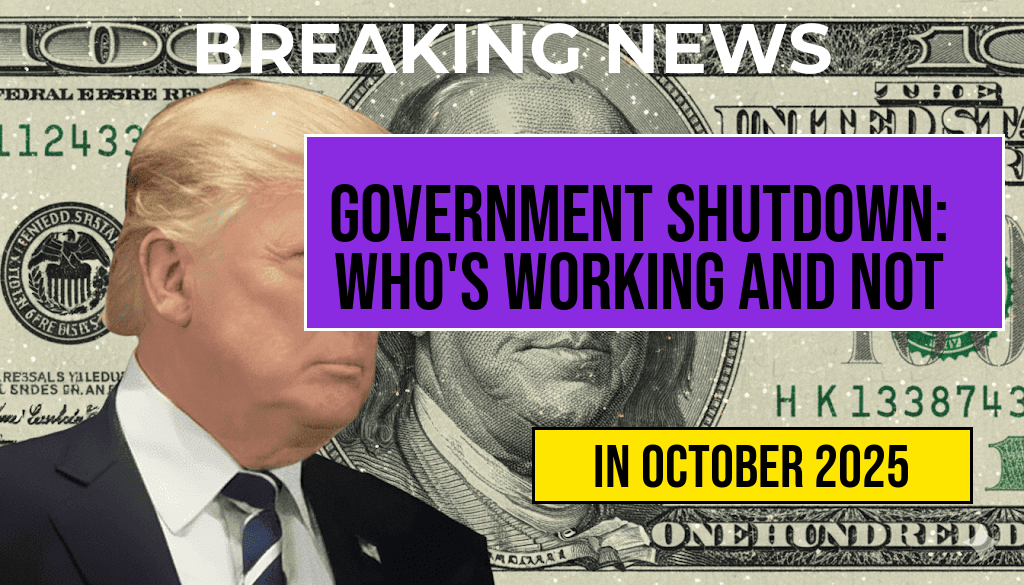The federal government has officially entered a shutdown period following the failure of Congress to pass a funding bill by the deadline. This impasse has led to a partial closure of numerous agencies and services, with some essential functions continuing despite the lapse in appropriations. The shutdown impacts a broad spectrum of government operations, from social safety net programs like Social Security to national security efforts managed by the Department of Defense and security screenings conducted by the Transportation Security Administration (TSA). While certain services are maintained by law or emergency funding, many others are temporarily halted or operate with significantly reduced staff. This article provides a detailed agency-by-agency breakdown of what services are still available and which government functions have been suspended, clarifying who is working and who is not during this shutdown period.
Key Agencies and Their Operational Status During the Shutdown
Social Security Administration
- Operations: Most Social Security offices are closed to the public, and routine in-person services are suspended. However, vital functions such as benefit payments to recipients continue uninterrupted due to mandatory funding and automatic processes.
- Customer Service: Call centers remain operational, though they may experience increased wait times. Online services, including benefit management and inquiries, are accessible as usual.
- Staffing: Approximately 90% of SSA employees remain on duty to ensure the continuation of payments.
Internal Revenue Service (IRS)
- Operations: The IRS largely halts new processing of tax returns and audits during the shutdown. However, some critical functions, including the processing of paper returns and refunds, continue under existing funding provisions.
- Customer Assistance: Phone lines and taxpayer support are limited, with many services suspended. Tax deadlines remain unchanged, but some services may experience delays.
- Staffing: Approximately 80% of IRS employees are furloughed, with only essential personnel remaining active to manage refunds and critical compliance issues.
Department of Defense (DoD)
| Personnel Type | Status | Comments |
|---|---|---|
| Active Duty Military | Working | Continues to perform national security duties |
| Civilian Employees | Varies | Some are furloughed; those deemed critical or essential continue working |
| Support Contractors | Furloughed | Most contractors are temporarily furloughed unless contracted for critical missions |
Overall, defense operations related to national security persist, though administrative and non-essential functions are scaled back.
Transportation Security Administration (TSA)
- Security Screenings: TSA officers remain on duty to ensure airport security, as their funding is considered mandatory under law.
- Office Operations: Administrative offices and traveler assistance services are limited or closed.
- Staffing: TSA personnel continue screening passengers at airports nationwide, maintaining operational integrity despite the shutdown.
Other Key Agencies
- Environmental Protection Agency (EPA): Most employees are furloughed; environmental monitoring and enforcement activities are suspended.
- FBI and Department of Homeland Security (DHS): Essential law enforcement and homeland security functions continue without interruption.
- National Parks Service: Most parks and visitor centers are closed, with only limited staff maintaining security and emergency services.
Impacts on Public Services and Federal Employees
The shutdown’s ripple effects extend beyond agency operations. Many federal workers face furloughs, with paychecks delayed until funding is restored. Small businesses that rely on government contracts experience uncertainty, and delays in processing permits or applications can hinder economic activities. Public health agencies involved in disease control and emergency preparedness operate with minimal staffing, raising concerns about readiness and response capabilities.
Legal and Political Context
The shutdown stems from ongoing disagreements in Congress over budget allocations and policy provisions. While some agencies are protected by law from shutdown impacts, others lack sufficient emergency funding, leading to widespread closures or reduced services. Historically, government shutdowns have underscored the delicate balance between legislative priorities and operational continuity, often prompting negotiations aimed at reopening funding streams.
Resources for Affected Citizens
Individuals needing assistance with Social Security benefits can visit the Social Security Administration website. Taxpayers seeking IRS services should consult the IRS official site for updates and guidance. For travelers, the TSA provides real-time alerts on airport conditions and security procedures through their official portal.
Looking Ahead
Resolution of the funding dispute remains uncertain, with Congressional leaders engaged in negotiations to prevent further disruptions. The shutdown’s duration will influence the pace at which affected agencies can resume full operations, and citizens are advised to stay informed via official government channels.
Frequently Asked Questions
What essential services are still operational during the government shutdown?
During the government shutdown, certain essential services such as Social Security, the IRS, Defense, and TSA continue to operate to ensure critical functions remain available to the public.
Which federal employees are required to work despite the shutdown?
Federal employees involved in critical functions like national security, public safety, and healthcare are required to continue working even during the shutdown. This includes personnel in agencies such as the Department of Defense and Transportation Security Administration (TSA).
Which federal services are temporarily halted during the shutdown?
Non-essential federal services such as passport processing, national parks, and certain administrative functions are temporarily suspended until the government reopens.
How does the shutdown affect Social Security recipients?
Social Security benefits are considered essential services, so payments will continue to be processed and delivered to beneficiaries despite the government shutdown.
Will the IRS still process tax returns and refunds during the shutdown?
During the government shutdown, the IRS will continue processing tax returns and refunds for essential cases, but some services like customer support and audit operations may be limited or paused.






